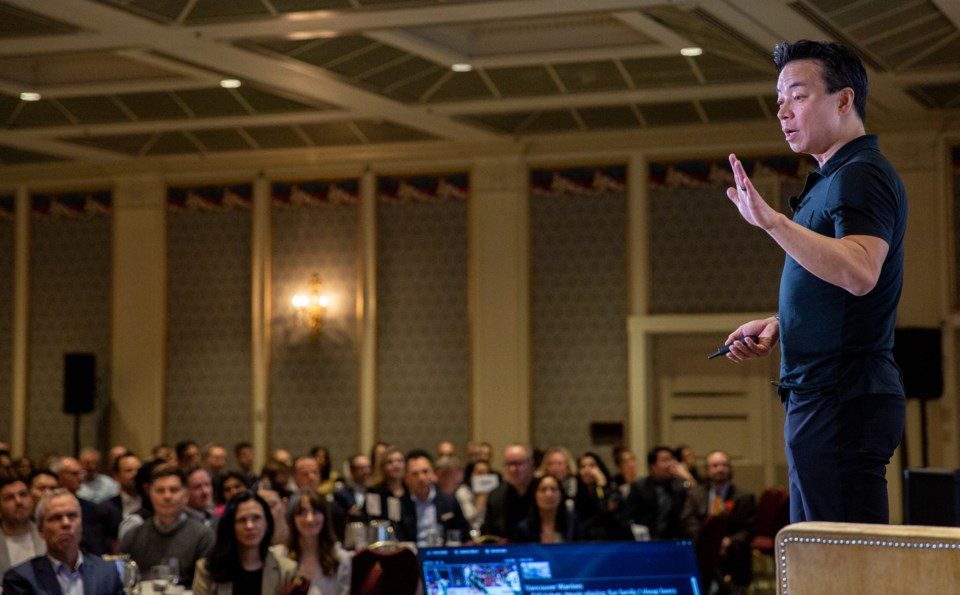Vancouver Mayor Ken Sim suggested Thursday that up to $100 million is “sitting on the table” and could be collected from wealthy people and organizations in return for naming rights of city buildings, parks and other city-owned assets.
If that money were to be unlocked, Sim said, “you could have a situation where we actually have a property tax decrease in the future,” even with inflation running at three or four per cent.
The mayor made the comment during a question-and-answer period with Greater Vancouver Board of Trade CEO Bridgitte Anderson. He spoke to Anderson following his “state of the city” address to a packed ballroom of business people at the Fairmont Hotel Vancouver.
“It's absolutely crazy that hospitals and universities [are] naming their buildings left, right and centre and we have all these buildings, all these assets, all these parks,” he said.
“As long as they fit in our core values, why aren't we putting names on all of them by people that really want to contribute? If we do that, we will have more impact on affordability than anything else.”
In a media scrum after the event, Sim told reporters the $50 million to $100 million he suggested to Anderson was a “guesstimate,” and acknowledged there needs to be “a lot more due diligence” on the city’s part to determine how much private money might be available.
“I'm not an expert in naming rights, but I just see a lot of assets in the city of Vancouver,” the mayor said. “We have over 200 parks, we have city-owned buildings across the spectrum. So whatever the number is, it will be significant.”
Abolition of park board
Sim’s comments come as public and political debate continues over his announcement in December 2023 to abolish the elected park board and have parks and recreation be brought under the direct control of city council.
Concerns raised by citizens at a council meeting in December and at a town hall meeting Thursday night are that Sim’s move equates to “a land grab” and calls into question the future use of Vancouver’s parks.
That debate also coincides with the release of the mayor’s budget task force report in January, which referenced naming and sponsorship rights of city assets as a potential revenue generator for the city.
“Donations to the city and sponsorships by businesses presently contribute only a marginal portion of the city’s overall revenues,” said the report, noting they are currently managed through a “decentralized departmental approach,” resulting in varied efforts and outcomes.
“If the city were to shift towards a more centralized model, with a distinct mission, initiatives and goals, it could become a good investment for Vancouver, potentially resulting in a substantial increase in philanthropic revenue and other benefits.”
'Cannot flush toilets'
The mayor referenced the report and its recommendations in his speech.
“We're going to monetize a lot of underutilized assets,” he told the crowd. “We have billions of dollars of assets that aren't getting optimal returns.”
Property taxes have increased by 10.7 per cent and 7.5 per cent under Sim’s ABC Vancouver-led administration. Members of the city’s finance team told council in June 2023 that hikes could be set at an average of nine per cent each year over the next five years.
The mayor suggested living in Vancouver would have been more expensive over the past 14 months of his leadership, if council had not scrapped the single-use cup fee, prevented a bike lane from being built on Broadway and stopped the so-called road tax.
At the same time, he acknowledged the city still has a $500-million infrastructure deficit.
“If we don't do something about it, in 20 years we could have a situation where you cannot flush toilets in certain parts of the city,” he said of the need to spend more of taxpayers’ money. “So we're taking it on, we're doing the right thing, we happily invest in that infrastructure.”




